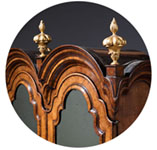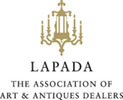Pair of George IV Regency Specimen Wood Parquetry Boxes of Sarcophagus Shape
Sold
Request Information
Follow Us
Pair of George IV Regency Specimen Wood Parquetry Boxes of Sarcophagus Shape
An extremely rare and fine pair of George IV Regency exotic timber boxes of sarcophagus shape, decorated to all surfaces and lined in silk velvet.
The finely veneered top is decorated in exotic hardwoods in a ‘tumbling block’ fashion, banded in rosewood and fine stringing of box and ebony, opening on both of the original hinges.
Every side is carefully decorated with what is known as ‘Van Dyke’ triangles raised and raised on the original feet.
The interior is lined in black silk velvet.
Orignal locks, lock keeps and it is most likely that the keys are original too.
I am not certain of the boxes exact purpose but they would work very well as jewellery boxes, games boxes or purely for decoration on a mantelpiece, pair of console tables, dressing tables, sideboards, pair of chests, etc.
Points of interest: It should be noted that pairs of any boxes from the period are rare and they are exceptional examples in the most wonderful original condition. This is a case of perfect, classic and timeless design.
Tumbling blocks have been utilized for centuries and the design is first thought to first appear in ancient Greece and Rome. The design was revived in the Renaissance, Baroque and Regency era, all the way to the present day.
Condition
Good. Wear consistent with age and use.
Dimensions
Height: 4.73 in. (12 cm)
Width: 11.03 in. (28 cm)
Depth: 9.06 in. (23 cm)
PREVIOUSLY SOLD
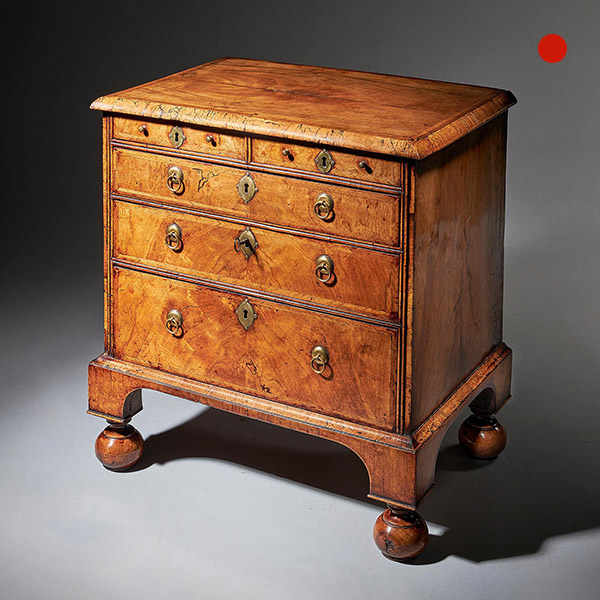
An extremely rare George I walnut chest of small proportions on ball and bracket
An extremely rare George I walnut chest of small proportions on ball and bracket SOLD Follow UsAn extremely rare George I walnut chest of small proportions on ball and bracket The cross-grain moulded and feather banded book-matched top sits...
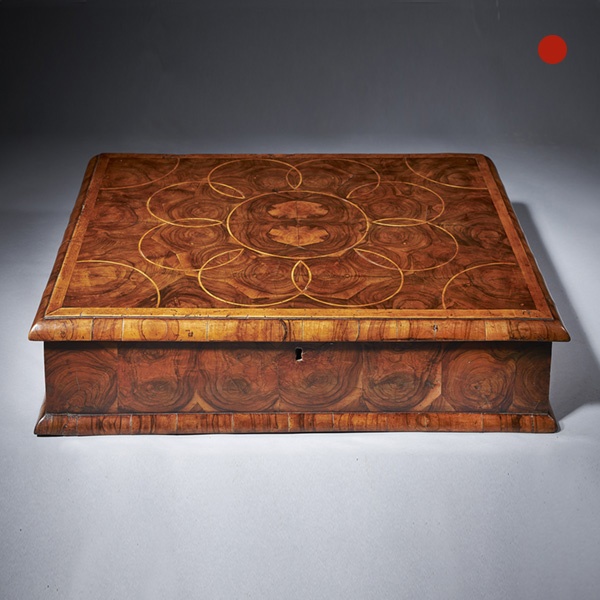
Fine and Rare Late 17th Century William and Mary Olive Oyster Lace Box
Fine and Rare Late 17th Century William and Mary Olive Oyster Lace Box Sold Follow UsFine and Rare Late 17th Century William and Mary Olive Oyster Lace Box A fine and rare late 17th century olive oyster 'lace box from the reign of King...
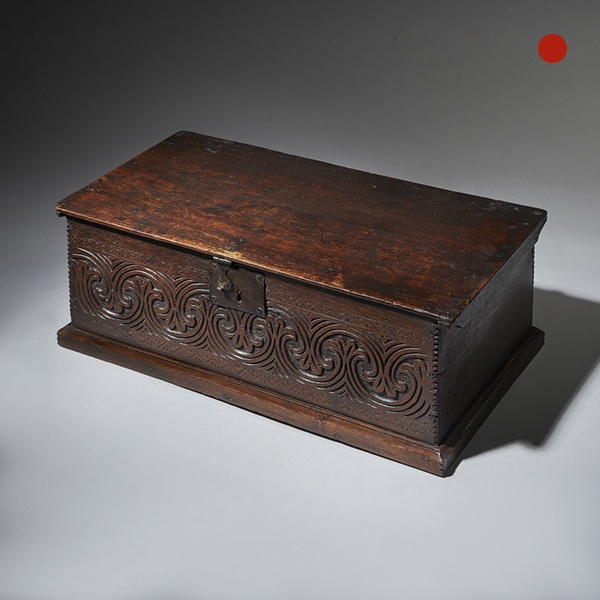
Late 17th Century Charles II Carved Oak Bible Box, Deed Box, Blanket Box,or Candle Box
Late 17th Century Charles II Carved Oak Bible Bo, Deed, Blanket, or Candle Box Sold Follow UsLate 17th Century Charles II Carved Oak Bible, Deed, Blanket, or Candle Box A superb and original late 17th century oak box with excellent and deep...
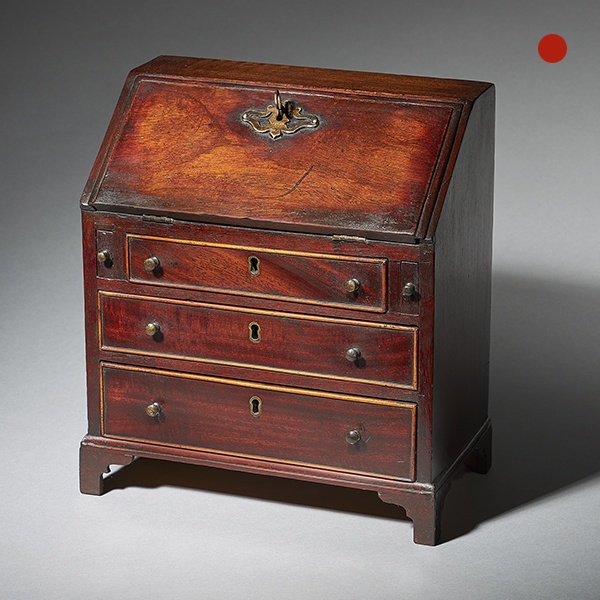
18th Century George II Mahogany Miniature Bureau
18th Century George II Mahogany Miniature Bureau SOLD Follow Us18th Century George II Mahogany Miniature Bureau What came first.... the miniature or the full scale? This small scale model at just 9” wide dates from the very beginning of the...
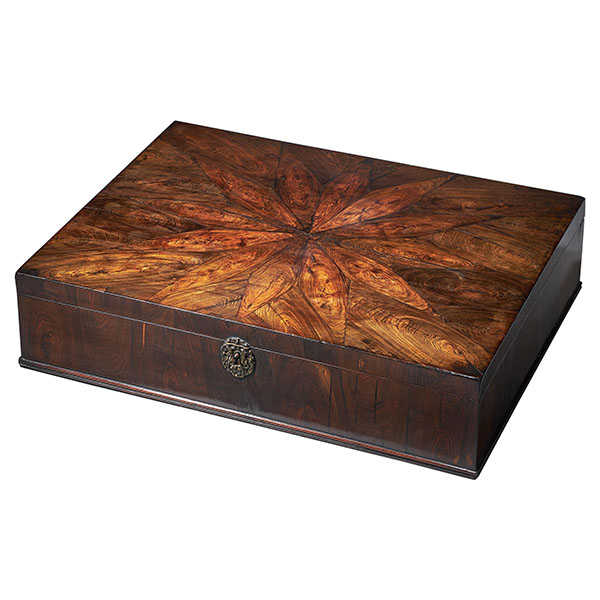
17th Century Charles II Cocuswood Lace Box, Circa 1660, England
17th Century Charles II Cocuswood Lace Box, Circa 1660, England SoldFollow Us17th Century Charles II Cocuswood Lace Box, Circa 1660, England An extremely rare and important Cocuswood oyster (Brya ebenus) lace box from the reign of Charles II,...
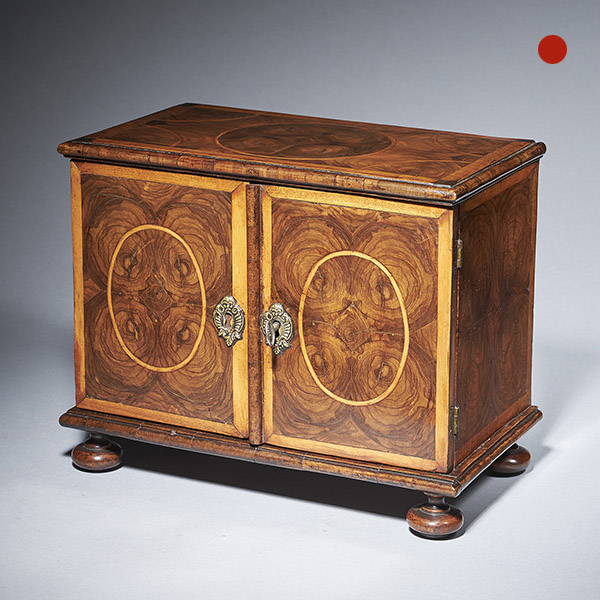
17th-Century miniature table cabinet
The miniature table cabinet opens to an arrangement of drawers, a row of four, a bank of four and a long pen drawer, similarly veneered in oysters of olive.

An extremely rare George I walnut chest of small proportions on ball and bracket
An extremely rare George I walnut chest of small proportions on ball and bracket SOLD Follow UsAn extremely rare George I walnut chest of small proportions on ball and bracket The cross-grain moulded and feather banded book-matched top sits...

Fine and Rare Late 17th Century William and Mary Olive Oyster Lace Box
Fine and Rare Late 17th Century William and Mary Olive Oyster Lace Box Sold Follow UsFine and Rare Late 17th Century William and Mary Olive Oyster Lace Box A fine and rare late 17th century olive oyster 'lace box from the reign of King...

Late 17th Century Charles II Carved Oak Bible Box, Deed Box, Blanket Box,or Candle Box
Late 17th Century Charles II Carved Oak Bible Bo, Deed, Blanket, or Candle Box Sold Follow UsLate 17th Century Charles II Carved Oak Bible, Deed, Blanket, or Candle Box A superb and original late 17th century oak box with excellent and deep...

18th Century George II Mahogany Miniature Bureau
18th Century George II Mahogany Miniature Bureau SOLD Follow Us18th Century George II Mahogany Miniature Bureau What came first.... the miniature or the full scale? This small scale model at just 9” wide dates from the very beginning of the...

17th Century Charles II Cocuswood Lace Box, Circa 1660, England
17th Century Charles II Cocuswood Lace Box, Circa 1660, England SoldFollow Us17th Century Charles II Cocuswood Lace Box, Circa 1660, England An extremely rare and important Cocuswood oyster (Brya ebenus) lace box from the reign of Charles II,...

17th-Century miniature table cabinet
The miniature table cabinet opens to an arrangement of drawers, a row of four, a bank of four and a long pen drawer, similarly veneered in oysters of olive.
YOU MAY ALSO LIKE
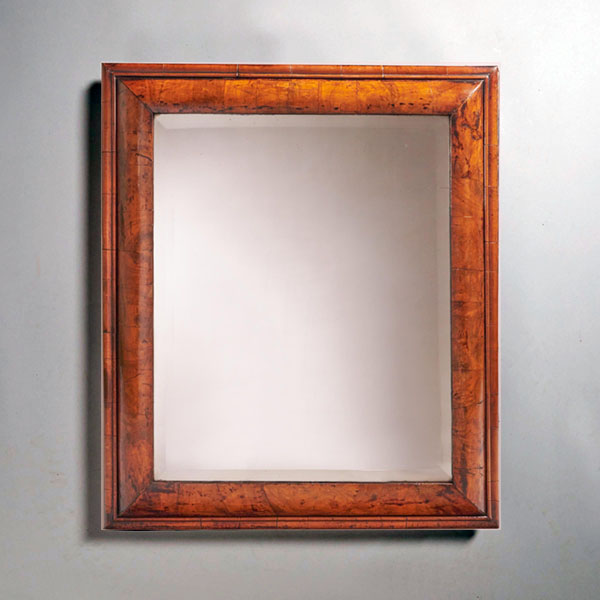
A Fine William and Mary 17th Century Figured Walnut Cushion Mirror C, 1690
A Fine William and Mary 17th Century Figured Walnut Cushion Mirror C, 1690 £6,500Follow UsA Fine William and Mary 17th Century Figured Walnut Cushion Mirror C, 1690 A large William and Mary 17th century figured walnut cushion mirror, circa...
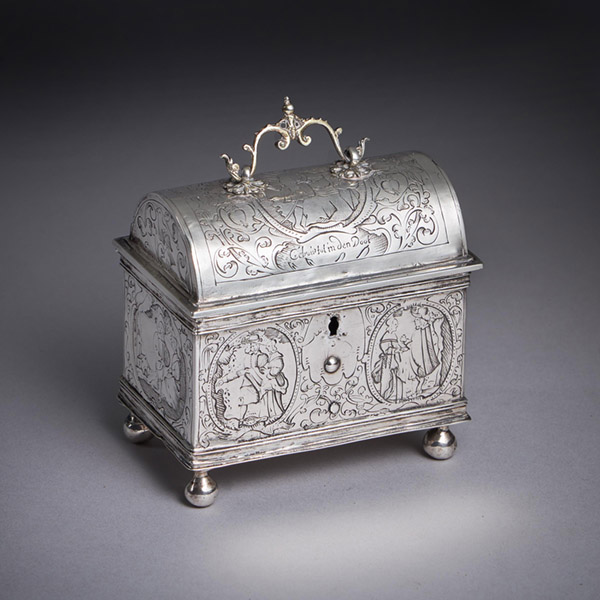
A museum-grade mid-17th century Dutch silver marriage casket or knottekistje, circa 1660
A museum-grade mid-17th century Dutch silver marriage casket or knottekistje, circa 1660 £9,500 [wpforms_selector form_id="11387" show_title="on" _builder_version="4.22.1" _module_preset="default" custom_margin="-30px||||false|false"...
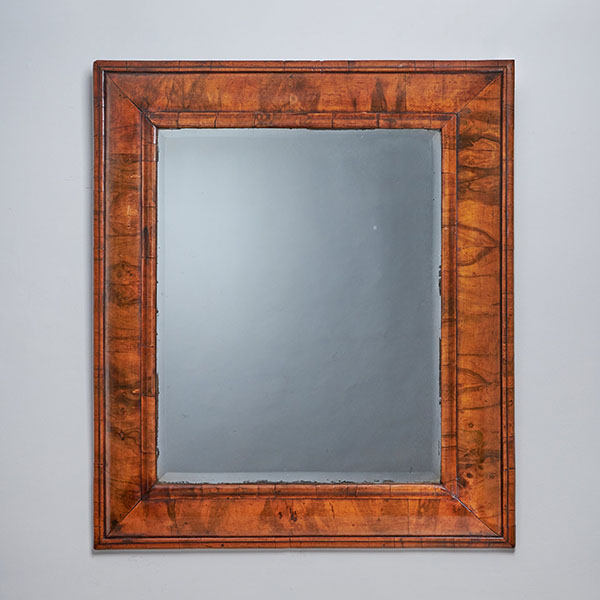
Large William and Mary 17th Century Figured Walnut Cushion Mirror c, 1690
Large William and Mary 17th Century Figured Walnut Cushion Mirror c, 1690 £7,495[wpforms_selector form_id="11387" show_title="on" _builder_version="4.22.1" _module_preset="default" custom_margin="-30px||||false|false" global_colors_info="{}"...
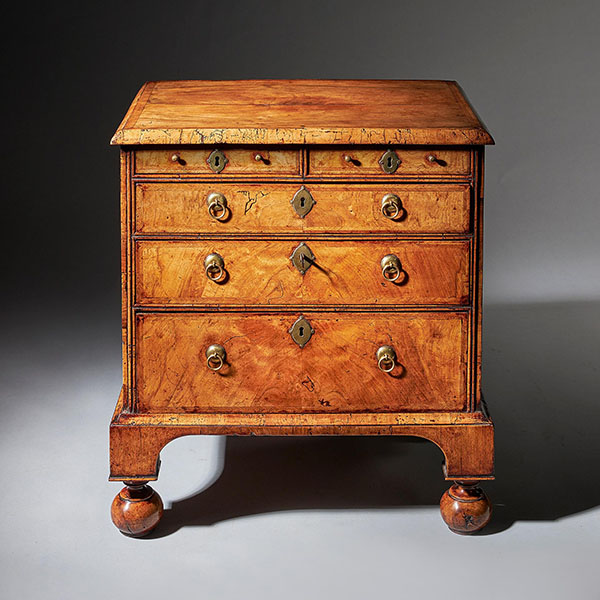
An extremely rare George I walnut chest of small proportions on ball and bracket
An extremely rare George I walnut chest of small proportions on ball and bracket £18,800[wpforms_selector form_id="11387" show_title="on" _builder_version="4.22.1" _module_preset="default" custom_margin="-30px||||false|false"...
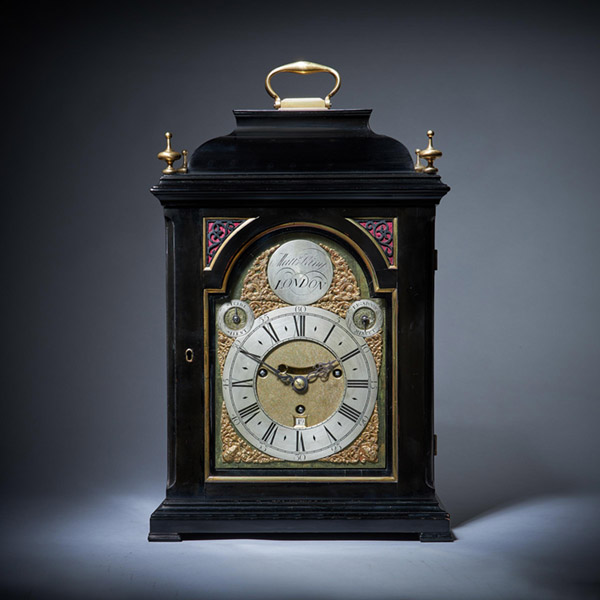
A Rare 18th Century George II Musical Table Clock by Matthew King, c. 1735.
A Rare 18th Century George II Musical Table Clock by Matthew King, c. 1735. £24,500[wpforms_selector form_id="11387" show_title="on" _builder_version="4.22.1" _module_preset="default" custom_margin="-30px||||false|false"...
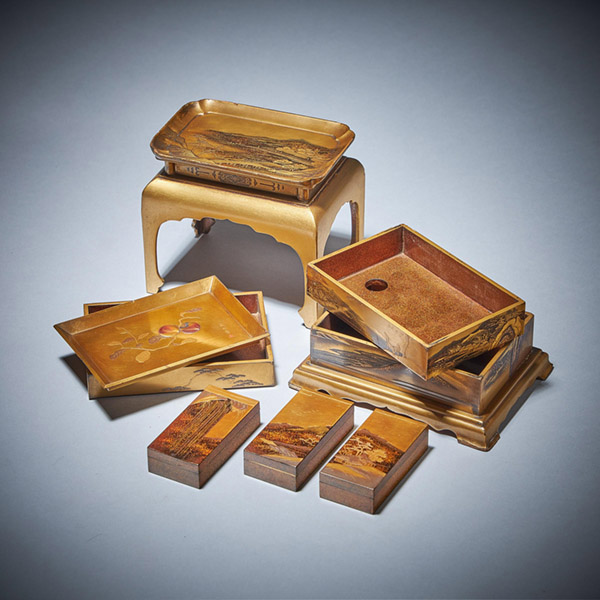
Signed Mid 19th C. Edo/Meiji Period Diminutive Lacquer Stacking Cabinet, Japan
Signed Mid 19th C. Edo/Meiji Period Diminutive Lacquer Stacking Cabinet, Japan £5,800[wpforms_selector form_id="11387" show_title="on" _builder_version="4.22.1" _module_preset="default" custom_margin="-30px||||false|false"...

A Fine William and Mary 17th Century Figured Walnut Cushion Mirror C, 1690
A Fine William and Mary 17th Century Figured Walnut Cushion Mirror C, 1690 £6,500Follow UsA Fine William and Mary 17th Century Figured Walnut Cushion Mirror C, 1690 A large William and Mary 17th century figured walnut cushion mirror, circa...

A museum-grade mid-17th century Dutch silver marriage casket or knottekistje, circa 1660
A museum-grade mid-17th century Dutch silver marriage casket or knottekistje, circa 1660 £9,500 [wpforms_selector form_id="11387" show_title="on" _builder_version="4.22.1" _module_preset="default" custom_margin="-30px||||false|false"...

Large William and Mary 17th Century Figured Walnut Cushion Mirror c, 1690
Large William and Mary 17th Century Figured Walnut Cushion Mirror c, 1690 £7,495[wpforms_selector form_id="11387" show_title="on" _builder_version="4.22.1" _module_preset="default" custom_margin="-30px||||false|false" global_colors_info="{}"...

An extremely rare George I walnut chest of small proportions on ball and bracket
An extremely rare George I walnut chest of small proportions on ball and bracket £18,800[wpforms_selector form_id="11387" show_title="on" _builder_version="4.22.1" _module_preset="default" custom_margin="-30px||||false|false"...

A Rare 18th Century George II Musical Table Clock by Matthew King, c. 1735.
A Rare 18th Century George II Musical Table Clock by Matthew King, c. 1735. £24,500[wpforms_selector form_id="11387" show_title="on" _builder_version="4.22.1" _module_preset="default" custom_margin="-30px||||false|false"...

Signed Mid 19th C. Edo/Meiji Period Diminutive Lacquer Stacking Cabinet, Japan
Signed Mid 19th C. Edo/Meiji Period Diminutive Lacquer Stacking Cabinet, Japan £5,800[wpforms_selector form_id="11387" show_title="on" _builder_version="4.22.1" _module_preset="default" custom_margin="-30px||||false|false"...
